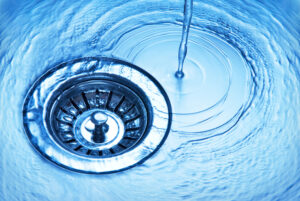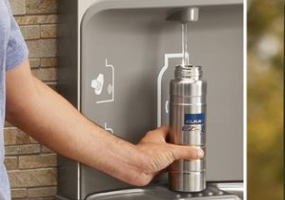
International Code Council Celebrates World Water Day
Addressing water scarcity and the need for sanitation and access to clean water globally during World Water Day
World Water Day is an annual campaign that raises awareness of the global water crisis by advocating for the sustainable management of freshwater resources. This year’s theme “Glacier Preservation” highlights how glaciers are critical to life and how we must work together to put glacier preservation at the core of our plans to tackle the global water crisis.
World Water Day is about the critical role water plays in sustaining life and fostering global development. It serves as a platform to advocate for equitable access to clean water and sanitation, promoting the well-being of both people and the planet.
For decades, the Code Council’s codes and standards have addressed water-related issues, and the organization remains committed to working with member jurisdictions and industry partners to bring water-efficient products to market, help new homes and structures become more water-efficient and spread the word about the need for improved water conservation.
This March, the Code Council’s annual World Water Awareness campaign raises awareness about the global water crisis and the collective responsibility to address it through long-term, consistent water conservation efforts. Learn more and get involved, here.

Assisting With Water Conservation and Efficiency
The Code Council’s PMG Code Action Committee’s Water Reuse Working Group was formed to address how on-site non-potable water reuse is becoming more predominant in the built environment. This diverse working group will continue to research all aspects of on-site water reuse, develop a roadmap and propose needed resources – including recommended updates to the International Codes® (I-Codes) – that are necessary to meet jurisdictions’ water reuse goals. Read about the future of on-site direct potable water reuse here.
The Code Council and the Residential Energy Services Network (RESNET) collaborated to develop a water efficiency rating system, known as HERSH20, that builders can use in the U.S. to evaluate and market a home’s water usage efficiency. Since this program began, the organizations further developed the RESNET/ICC Standard 850-2020 Standard – Calculation and Labeling of the Water Use Performance of One- and Two-Family Dwellings Using the Water Rating Index and are developing the RESNET/ICC 1450 Standard – Remote Virtual Inspection for Energy and Water Performance in Buildings.
The Code Council also is a partner in the U.S. Environmental Protection Agency’s (EPA) WaterSense program, a major water efficiency initiative developed to help consumers identify water-efficient products that meet EPA’s criteria for efficiency and performance.
The Code Council’s Evaluation Service (ICC-ES) is an industry leader in technical evaluations of building products and an EPA-licensed certifier. Products that earn the WaterSense label with the ICC-ES certification mark are certified to be at least 20 percent more water-efficient without sacrificing performance.
Last year, the Code Council signed a Memorandum of Understanding (MOU) with the EPA to advance initiatives aimed at addressing decentralized wastewater issues. As part of the MOU, the Code Council will help bolster the EPA’s Closing America’s Wastewater Access Gap Program, which aims to address the disparity in wastewater infrastructure across the U.S. – particularly in underserved communities. Read more about the program here.
The Code Council also became a signatory of the Windsor Declaration, a landmark pledge to reduce water waste and combat infection risks through innovative solutions and collaborative efforts. You can read more about it here.
The International Codes and Water Safety
The Code Council’s codes and standards have ensured safe plumbing systems in both residential and commercial buildings and addressed water-related issues for decades — its building, plumbing and green codes help protect clean water for future generations through proper construction, conservation and safe disposal.
The International Plumbing Code® (IPC) incorporates innovative technologies, including waterless urinals and engineered designs that permit the installation of water supply and sanitary drainage systems that result in the savings of millions of gallons of water. This I-Code provides a good balance of performance-based and prescriptive requirements that make it flexible in its approach to water-saving issues and continues to build upon previously established water efficiency standards by going through a regular update process.
The IPC is part of a complete building safety system, providing an integral component necessary to stay current with the latest building safety technologies while meeting the public health, sanitation and safety requirements necessary for the built environment.
- The International Residential Code® (IRC) contains many of the same water efficiency provisions that are noted in the IPC. The provisions in the IRC for collecting, storing and using various types of non-potable water recognize the growing need for water conservation and the increase in the development of water conservation programs in many regions of the U.S.
- The International Green Construction Code® (IgCC) contains water efficiency provisions that apply to both site and building, including specific requirements for plumbing fixtures and fittings (e.g., faucets, showerheads, water closets) based on the EPA’s WaterSense Program and the EPA in partnership with the U.S. Department of Energy’s (DOE) Energy Star Program for appliances (e.g., clothes washers, dishwashers).
- The International Private Sewage Disposal Code® (IPSDC) includes provisions for the design, installation and inspection of private sewage disposal systems, and provides flexibility in the development of safe systems. The IPSDC facilitates the use of the latest science-based best practices and innovative technologies in safely handling onsite, decentralized wastewater, thereby reducing customers’ costs. The IPSDC also addresses inconsistencies within many regulations that dictate how decentralized wastewater systems can be designed, installed and operated.
- The International Water Conservation Code Provisions® (IWCCP) is the most comprehensive tool for the design, installation and administration of potable and non-potable water conservation and efficiency systems. It contains all the water conservation and hot water energy-saving requirements from the I-Codes for both residential and commercial occupancies including provisions from the IgCC and International Energy Conservation Code® (IECC).
Water and Standards
As the creation of sustainable and resilient buildings becomes a greater priority, water conservation and efficiency have become crucial conversations amongst building safety professionals in recent years. As the building industry looks to increase water efficiency within both new and existing buildings, the Code Council has worked toward ensuring water efficiency in buildings and structures through its innovative standards, which address water efficiency and conservation.
Below are some of the standards that address water efficiency, either in whole or in part:
- The new ICC 815 Standard (in development) for Sizing Water Distribution, Sanitary Drainage and Vent Piping Systems is a research-led initiative that will reinvent the way plumbing systems are designed and sized in collaboration with international subject matter experts and academia.
- The new ICC 825 Standard (in development) for Residential Onsite Wastewater Treatment Systems will take a global approach to develop minimum requirements to safeguard the health, safety and general welfare of the public and address societal and industry challenges through designing, constructing, operating and maintaining such systems. Furthermore, the new standard will focus on the impacts of a changing climate, and how better to design and install such systems to be more resilient to extreme weather events.
- The new ICC / MBI 1210 Standard for Mechanical, Electrical, Plumbing Systems, Energy Efficiency and Water Conservation in Off-site Construction addresses mechanical, electrical and plumbing system elements (MEP) used in off-site construction with respect to energy efficiency, water conservation, planning, designing, fabricating, transporting and assembly within commercial and residential buildings.
- A collaborative effort of the International Code Council, ASHRAE and the National Association of Home Builders, ICC 700 — National Green Building Standard outlines a variety of green practices, including energy and water efficiency, which can be incorporated into new homes and multifamily buildings.
- Standard CSA B805/ICC 805 — Rainwater Harvesting Systems addresses rainwater and storm water being used as source water for non-potable as well as potable applications. It is both ANSI-approved and SCC-accredited.

Providing Support to Communities
The Code Council joins many organizations worldwide in recognizing World Water Day by promoting initiatives that improve access to clean and plentiful water for all. The Code Council strives to develop modern codes and standards that make water systems more efficient and sustainable and help ensure that clean, safe water is available in all homes and buildings.
To learn more about water-related issues and how codes and standards can help, view the Code Council’s PMG webpage.
To stay updated on the latest PMG industry news, subscribe to the Code Council’s PMG newsletter here.







